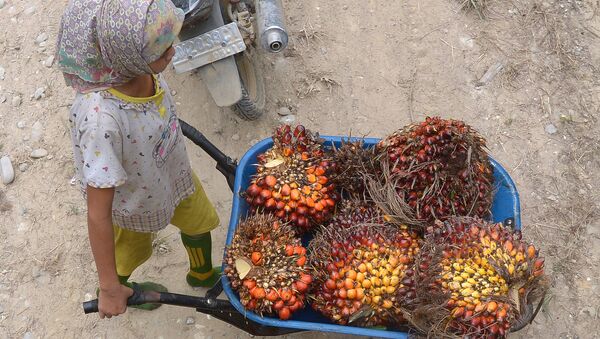The report, entitled: "The great palm oil scandal: Labour abuses behind big brand names," investigates palm oil plantations in Indonesia run by the world's biggest palm oil grower, Singapore-based agribusiness Wilmar, tracing palm oil to nine global firms: AFAMSA, ADM, Colgate-Palmolive, Elevance, Kellogg's, Nestlé, Procter & Gamble, Reckitt Benckiser and Unilever.
"The key findings are that on Indonesian plantations there is child labor and forced labor, violations relating to the minimum wage and wide spread discrimination towards women. This is happening on plantations that are operated by Wilmar and much is being marketed and sold as certified or sustainable," Seema Joshi, Head of Business and Human Rights at Amnesty International, told Sputnik.
#PalmOil: Global brands profiting from child and forced labour https://t.co/xRSYS8fNIq pic.twitter.com/lbE1TyQ4kp
— amnestypress (@amnestypress) November 30, 2016
"What we did is look at the supply chains of nine big global brands and found that these widespread labor abuses are happening, yet the companies are not doing enough to address them. But what they are doing — is marketing the product as sustainable palm oil. But they are not being honest and straightforward," Ms Joshi told Sputnik.
Wilmar, as well as other big brands, have to get approved by the Roundtable on Sustainable Palm Oil (RSPO) that audits companies and gives them a stamp of approval. Once approved by RSPO, businesses can claim their product is certified palm oil.
Over 50 percent of the products we consume contain palm oil. Wilmar trade in 435 of the palm oil products and again they are supplier to all of the big brands such as Kellogg's, P&G, who produce Dove soap and Head and Shoulders shampoo.
"We are massive consumers of palm oil, so what we find worrying is the fact that companies are not taking responsibility for this. So if you are an ethical consumer trying to make choices, you are failing to meet your own objective. What we are calling for is transparency and an end to the abuse," Ms Joshi told sputnik.
AI are also calling on the public to pressure the brands into taking responsibility by stopping companies like Wilmar from using forced labor.
"Yes, we are calling on the public to demand that their favorite companies are transparent about the products that contain palm oil and where it comes from. Unless companies are being pushed by the public they will not make the changes," Ms. Joshi told Sputnik.
AI want companies like Kellogg’s, who are deemed influential, to tell Wilmar to stop abusing workers and improve conditions on the plantations.
"Businesses needs to address this abuse and if Wilmar doesn't act, they should step in themselves. It's shocking there are children as young as eight working on the plantations, without any protective gear, where there is a high number of pesticides," Ms Joshi told Sputnik.
AI they have written to the big brands on several occasions with specific questions about how their products are sourced. Unilever and Nestle expressed serious concern; yet since the report was published, according to AI there has been no response from Unilever, and Nestle has said there needs to be multi stakeholder dialogue.
"This is weak and inappropriate, as many of the abuses that we have documented are criminal offences in Indonesia. If we found these offences in the UK we wouldn't say 'let's have a multi-stakeholder holder dialogue,' we need this addressed immediately. No more discussions but immediate action," Ms Joshi told Sputnik
Global brands exposed to #ConflictPalmOil made with child and forced labor, read @amnesty’s new report https://t.co/a0akeCikUR pic.twitter.com/9S7zJuRQMa
— RAN (@RAN) November 30, 2016
Forced labor is a modern plague on human rights and corporate social responsibility is more important than ever to prevent it from spreading.


